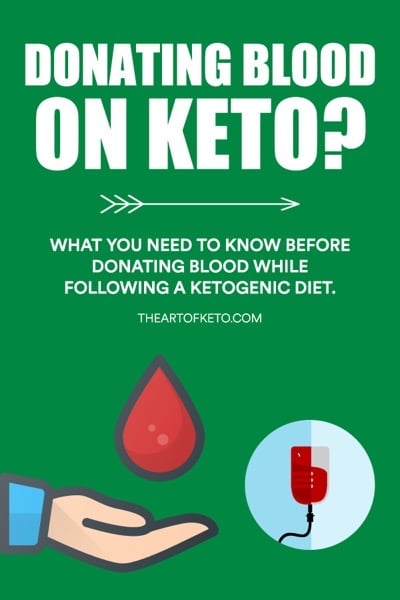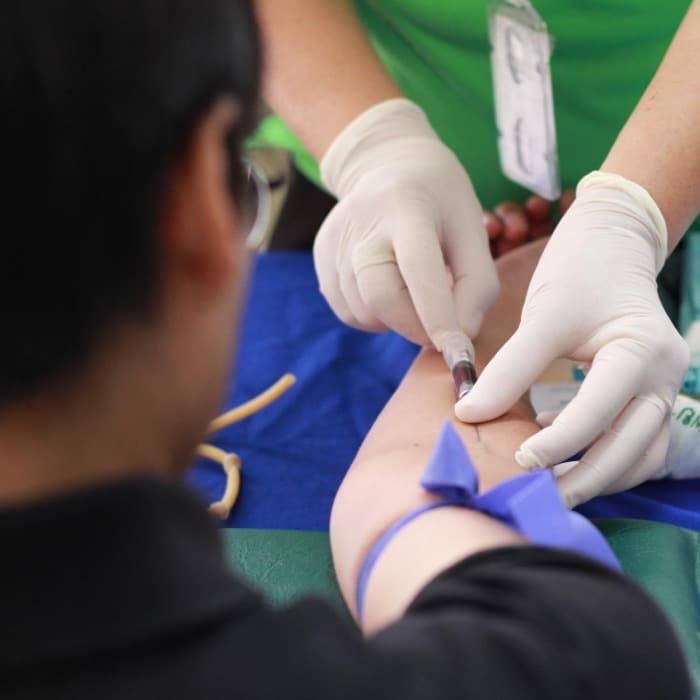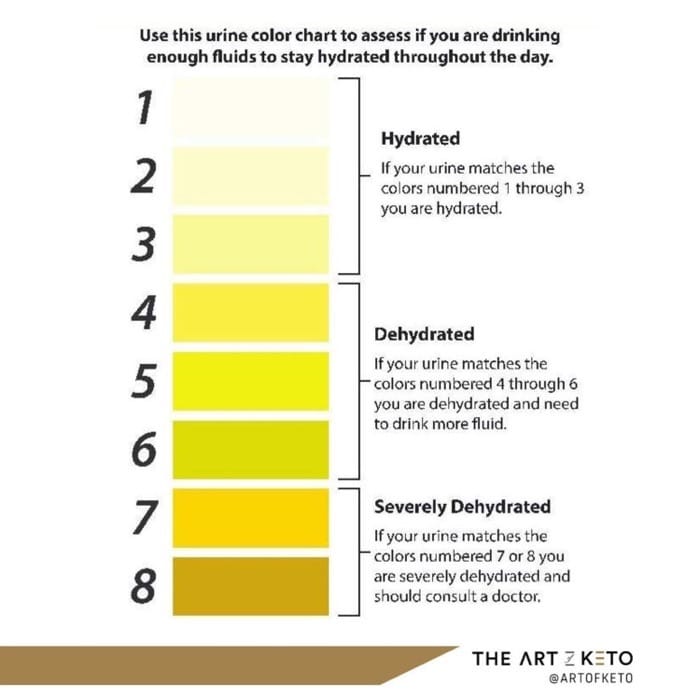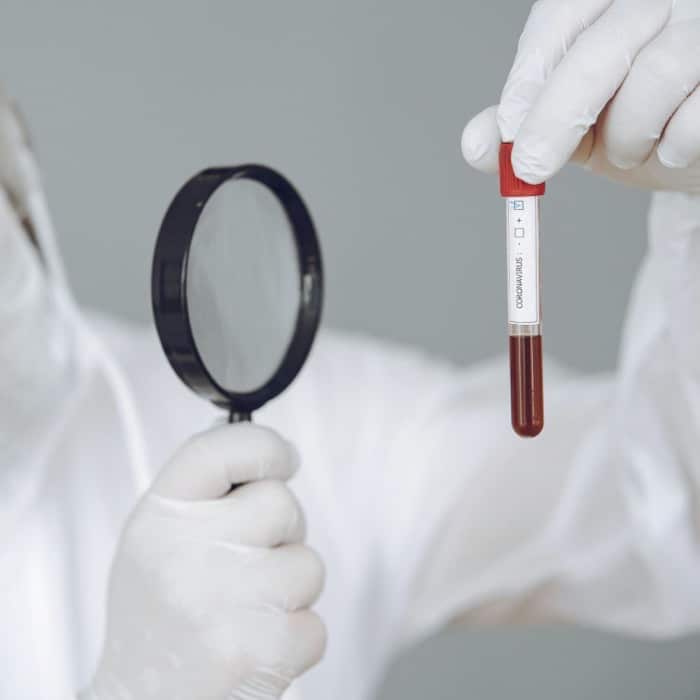You may wonder if you can donate blood while on a ketogenic diet, and that makes sense. After all, there are more intricacies with a ketogenic diet when compared to any other way of eating.
Donating blood while following a keto diet will not impact or negatively affect ketosis. According to the Red Cross, being on a ketogenic diet will also not deter you from any type of blood donation, including whole blood, power red, platelet, and plasma donation.
For starters, you have a higher level of ketones floating in your bloodstream, but does something like that prevent you from donating blood?
In this article, I’ll go over the requirements for donating blood, what to be mindful of when following a ketogenic diet and donating, and much more

Table of Contents
Keto And Blood Donation
Donating blood on keto was never really a thought of mine until someone DM’d me on Instagram asking.
I thought to myself, why wouldn’t you? I guess I also never gave it much thought since I’ve been donating blood almost every 3 months for who knows how long, it’s just something I’ve done.
So then I responded in kind asking why they believed there would be a problem with donating blood while on keto, to which they replied:
- Is it harmful for someone to receive blood with high levels of ketones?
- Will I be knocked out of ketosis if I donate blood?
- Is there anything I need to do differently before or after donating blood?
To which ALL THE answers to the above question was… No.
At least not really, but I’ll get to that in a second.
If you needed the go ahead to donate blood, you just got the thumbs up. Don’t let your diet dictate the incredible good you are doing by donating blood.
Can You Donate Plasma On Keto?
Similar to donating blood, plasma can also be donated while following a ketogenic diet.
There is nothing inherently different about your blood on a ketogenic diet (except for more ketones than your average person) that should prevent you from donating plasma.Donating plasma is like donating blood. The difference being, when you donate plasma, they return all the other components of your blood along with a sterile saline solution, minus the plasma.
The same premise applies for those who do a power red donation.
During a power red donation, you end up donating twice as many red blood cells, except this time they recycle your plasma and platelets back into your body, along with some saline.
Does Donating Blood Affect Ketosis?
To address your concerns about whether donating blood affecting ketosis, first I must ask… does it really matter?
Even if it did temporarily affect or knock you out of ketosis, Is that enough to deter you from doing good in the world, but I digress.
To answer your question…
No, donating blood will not affect ketosis.While you may see a temporary drop in ketone levels immediately after donating because of lower blood volume, you may see a rapid increase, sometimes greater than previously, as the body works to replenish what was lost.
Ketosis is a metabolic state that is predicated on greatly restricting the amount of carbohydrates you consume. Meaning, ketosis is determined by how little carbohydrates you eat, thus forcing your body and brain to seek an alternative fuel source.
Donating blood has no effect on this metabolic state. In fact, eating high amounts of fat also doesn’t have an effect.
It really is a matter of carbohydrate restriction.
What Are The Requirements For Donating Blood?

Mostly, to donate blood you must be in good health and feeling well. Aside from that, you need to be at least 16 years old in most states and weigh 110 lbs (50 kg).
If wanting to do a power red donation, which is double the red blood cells, males must be at least 17 and at least 5’1 130 lbs. Females must be at least 19 years old and at least 5’5 150lbs to do a power red donation.
By good health and feeling well, the Red Cross defines this as being able to perform normal activities. Even those with chronic conditions such as diabetes may donate blood as long as they are being treated and have the condition under control.
Aside from that, the Red Cross will ask you a series of questions which includes checking for any medications, travel to certain countries, certain medical conditions, and other miscellaneous items to determine eligibility.
I would strongly suggest for those of you looking to donate blood, keto or not, to either create an account online or their mobile app and answer the questions before arriving to your donation location.
Not only will this save you the trouble of wasting your time if you find that you’re not eligible to donate blood, but it saves you time from answering the questions when you get there. Once you’ve determined you’re eligible, you provide a QR code for them to scan before the donation.
What To Eat And Drink Before Donating On Keto
For donating blood, there are some simple things you can do before and after ensuring a smooth donation process.
Why you need to be mindful of hydration when donating blood on keto
First, you’ll want to make sure you’re well hydrated. For those following a ketogenic diet, especially those who just started a ketogenic diet, may unknowingly be de-hydrated.
While the body corrects itself over time, many people who just started a ketogenic diet are often dehydrated and lacking electrolytes. You can usually tell if this applies because you’ll often feel very sluggish and/or have flu-like symptoms, commonly referred to as the “keto flu.”
Many individuals attribute this to your body transitioning from burning sugar and carbohydrates for fuel to burning fat, and while partially true, it’s mainly because of dehydration and an electrolyte imbalance.
After starting a ketogenic diet, your body releases POUNDS of water within the first couple weeks. This is mainly because of the diuretic nature of a low-carbohydrate diet besides carbohydrates causing your body to store water.
For every carbohydrate your body stores, an additional 3 grams of water is stored with it. With your average adult able to store ~500 grams of carbohydrates, that’s 1500 grams of water (1.5kg) or close to 3.5 lbs of water that is being stored just by carbohydrates in your body.
As you drop carbohydrates and expel water, you also rid your body of vital electrolytes, thus causing a feedback loop of even more dehydration.
For this reason, it’s important you ensure you’re well hydrated and replace these vital electrolytes responsible for many functions in the body, one being fluid balance and retention.
Hydrating before donating blood on keto
Now that you know why it’s extra important to be mindful of your hydration, implementing it is the easy part.
How much water to drink on keto? Make sure you’re drinking enough water that your urine is between a level 1 and 3 as shown by the image below. While I would love to give you an exact amount, this amount will vary for individuals due to physiological differences and activity levels.

Basically, you want your urine color to be a very pale yellow, almost clear-like color.
If you’re taking vitamins or multivitamins, you may notice that your urine may be a little more yellow than usual for a short period afterward.
Over half of your blood is plasma, and plasma is 90% wanter. Therefore, water makes up more than half of your total blood volume… 1
So drink up!
In addition, you want to make sure you’re ingesting adequate electrolytes in your diet, especially sodium and potassium.
You can easily get in enough sodium by making sure you salt your foods liberally and to taste (I like using Redmond Real Salt). For potassium, increase keto-friendly potassium-rich foods like avocados, green leafy vegetables, and even include things like unsweetened yogurt.
For convenience, or what I would say an “insurance policy,” you could also supplement with an electrolyte beverage like zip fizz or use one planned with ketogenic dieters in mind, I like Keto Vitals Electrolyte Powder.
Nutrition before donating blood on keto
When donating blood, you’ll lose between 220-250 mg of iron. 2If choosing to donate using the Power Red, which is double the amount of red blood cells, you can expect to lose twice that amount.
Your body can take up to 30 weeks to replace the iron lost through a single blood donation, which is why it’s important to eat iron-rich foods when donating blood.
Iron is an essential mineral that helps maintain your strength and energy. Iron is also required to create new blood cells to replace the ones lost when you donate blood.
Some iron-rich, but also keto-friendly foods include:
- Beef
- Turkey
- Chicken
- Lamb
- Pork
- Eggs
- Shrimp
- Tuna
- Scallops
- Spinach
- Kale
- Chard
- Chocolate (Lily’s chocolate bars are my go-to or even some cocoa powder)
What To Eat And Drink After Donating Blood On Keto
After donating blood, you’ll likely be greeted to an assortment of sugar-filled juices and snacks. None of these options will be keto-friendly in the slightest.
However, for those of you in European countries, you may be greeted with some cheese, ham, and fish, almost similar to a charcuterie type platter. While I wish that was an option here in the United States, it seems we’re on different ends of the spectrum.
If you know you must take a bit of a timeout after donating blood before continuing with your day, it may be best to bring along some keto-friendly snacks.
Once you’re able, eating a keto-friendly meal that’s rich in some good fats and high in iron would be a great option to replenish those red blood cells.If you partake in the sugary snacks afterward, it’s not the end of the world. While you may be kicked out of ketosis momentarily, chances are if you limit yourself to something small you’ll get back into ketosis within a few hours or by the next day.
In addition, making sure you drink plenty of water and take in adequate amounts of electrolytes is highly encouraged. This might be a great time to bring along a packet of electrolytes like Keto Vitals Electrolytes and pour it into a bottle of water following your donation.
How long it takes to get into ketosis will vary, but so does how much it takes to knock yourself out of ketosis.
The most important thing you can do here is not let it spiral out of control and turn into a binge. Continue your diet as if it never happened and move on.
Even if you were kicked out of ketosis for a short period that doesn’t mean you stop burning fat, but more about that in the last section.
Do They Test For Ketones In Donated Blood?

After they top off the bag for donation, they usually fill up a few test tubes of your blood send to a testing laboratory. They perform tests to confirm your blood type and also to test for infectious diseases.
Assuming all goes well, you’ll not hear anything back about your test results. However, if the test result is positive for anything, your donation is disposed of and they will notify you of any abnormalities they’ve found.
As the saying goes, no news Is good news in this case.
The Red Cross tests for multiple diseases markers such as: 3
- Hepatitis B
- Hepatitis C
- HIV
- Zika
- Syphilis
- West Nile
From my experience, you’ll get text or email updates when and where your blood is headed to if all tests well. You’ll know exactly which county your blood is going, and possibly even the hospital where your blood is helping someone who greatly needs it.
Can You Drink Coffee Before Donating Blood?
There is nothing wrong with having a cup of Joe before donating blood. If you’re only drinking coffee at the expense of hydrating yourself with water, then that may be a problem.
The Red Cross suggests you drink an extra 16 oz. of water before you donate blood in addition to four extra glasses of water or other liquid following your donation.
Just a tidbit on coffee and hydration
Many individuals consider coffee to be a diuretic due to the diuretic effect caffeine may have. Despite these claims, caffeinated beverages such as tea and coffee are not dehydrating.
You’re still ingesting a greater volume of liquid versus you may end up peeing out, thus leaving you more hydrated.
I would, however, strongly suggest you do not consume alcoholic beverages before or after donating blood.
Intermittent Fasting And Donating Blood
Many of you who follow a ketogenic diet may also be intermittent fasting. So what should you do if your blood donation lands during your fasting window?
While intermittent fasting has no bearing on whether your blood is usable from a donation perspective, some people react to donating blood more than others.
If you’re the type that may feel sluggish or lightheaded when you donate blood or go without food for long periods, it may be best that you have a little snack prior to donation. Having something in your system will give you more energy and also provide your body with nutrients to begin replenishing itself right away.Can Donating Blood Help You Lose Weight?
Kind of.
When you donate blood, your body burns extra calories to replenish your blood supply. According to one source, you can burn upwards of 600 calories for donating one pint of blood.
Even if this were true, this amount would be trivial to your overall weight loss goal. That would be like saying running 5 miles one day will make you skinny.
Losing weight is about consistently making better choices. Just like eating one “off-plan” meal won’t make you fat, eating one salad won’t make you skinny.Weight loss, despite what other keto zealots may preach, is a matter of calorie balance. To lose weight, you must take in fewer calories than you burn.
With one pound of fat said to have 3500 calories, even if you burned 600 calories by donating blood, it’s not enough to make a difference in the big scheme of things.
Also, another thing to remember is that just being in ketosis DOES NOT mean weight loss will occur. Ketosis is a metabolic state, and there are benefits of being in ketosis for weight loss, but being in ketosis doesn’t guarantee you will lose weight.
CICO vs. keto is a wildly debated topic. You can still gain weight while following a ketogenic diet if you’re not mindful of what you eat. Weight loss still comes down to being in a negative calorie balance. i.e. burning more calories than you consume.
The Takeaway
There isn‘t much difference with donating blood on a ketogenic diet or your typical Standard American Diet (SAD).
While they may not afford you any keto-friendly snack options after your donation, you can always bring your own to ensure you have some sustenance before carrying on with the rest of your day.
Other than that, make sure you‘re well-hydrated before and after besides increasing your iron-rich foods like beef, chicken, liver, and other keto-friendly iron sources of food.
Frequently Asked Questions
Does Keto affect your blood?
Being on the keto diet can have an impact on your blood. People that have type 2 diabetes can lose weight and manage their blood sugar at the same time.
What's the best thing to eat before donating blood?
The best thing that you can eat before you decide to donate blood is foods that are rich in iron. These include red meat, fish, poultry, etc.
Does giving blood detox your body?
When you donate blood it offers you many benefits. One of the main benefits of donating blood is that it helps remove poly-fluoroalkyl substances.